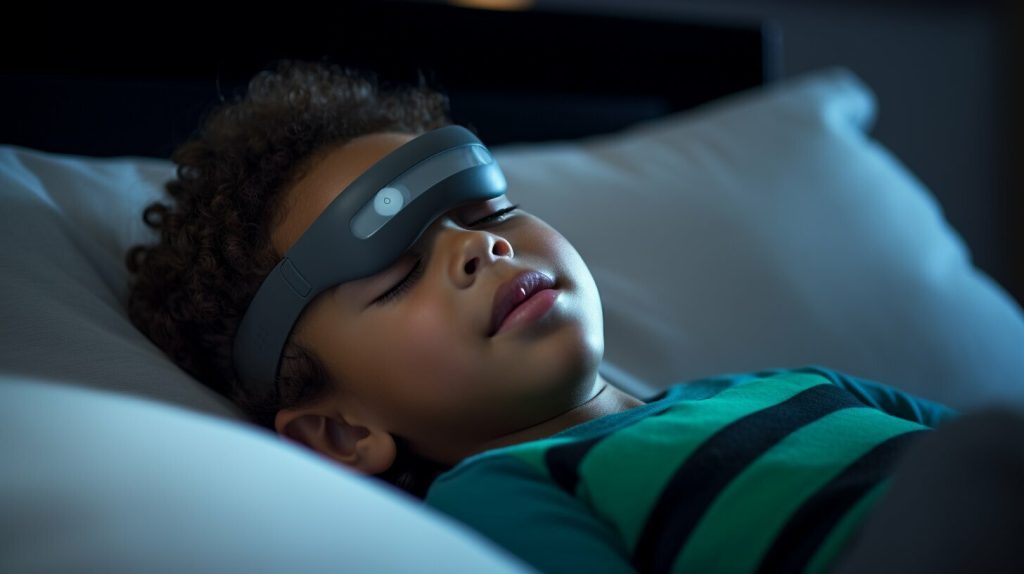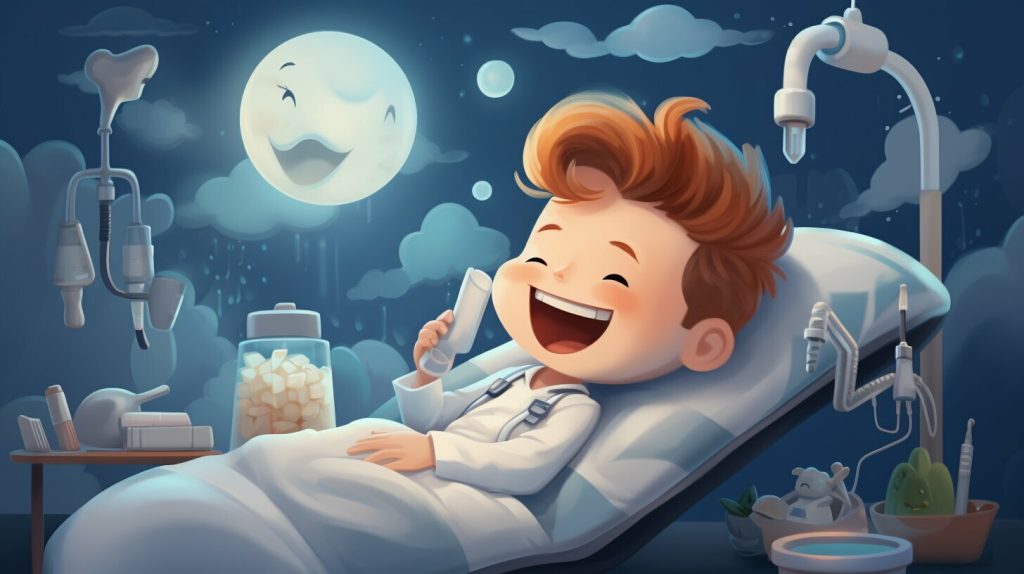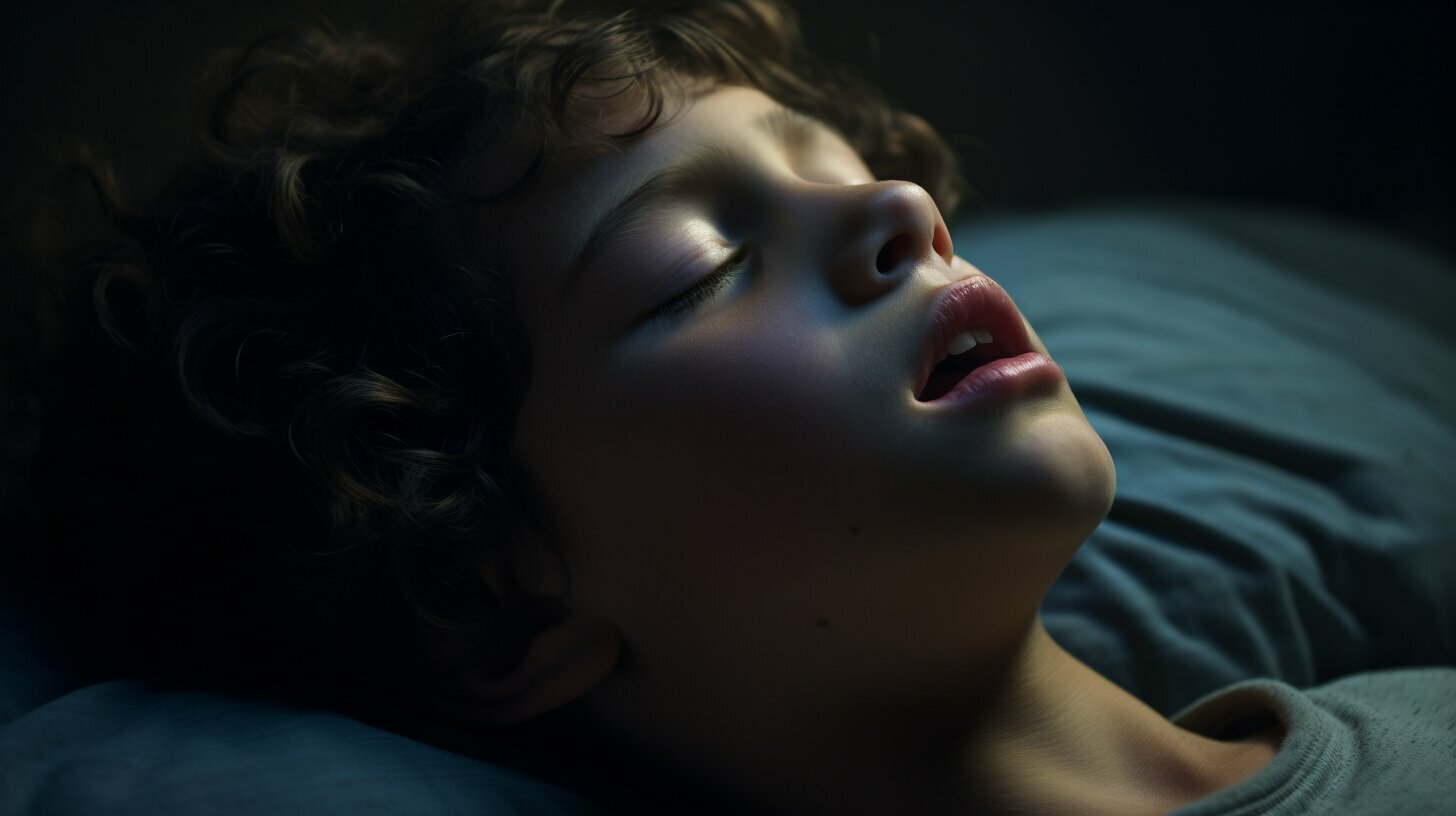Child grinding teeth in sleep, also known as bruxism, can be a concerning problem for parents. Fortunately, there are effective natural remedies to help alleviate this issue.
Teeth grinding is a common occurrence in children and teenagers during sleep and is often associated with stress, anxiety, and sleep problems. While there is no cure for bruxism, several methods can help reduce the frequency and intensity of teeth grinding.
To address child grinding teeth in sleep naturally, it is essential to focus on relaxation techniques, improving sleep hygiene, managing jaw pain, maintaining good oral care, and seeking professional help when necessary.
By implementing these strategies, parents can play an active role in minimising the impact of teeth grinding on their child’s well-being.
Important Points:
- Teeth grinding, or bruxism, is a common issue in children and teenagers during sleep.
- Stress, anxiety, and sleep problems are often linked to child teeth grinding.
- Natural remedies can help reduce the frequency and intensity of teeth grinding.
- Relaxation techniques, improving sleep hygiene, managing jaw pain, and regular dental check-ups are effective strategies.
- Professional help should be sought if teeth grinding persists or if there are underlying causes, such as anxiety.

Understanding Child Teeth Grinding
Before we explore how to stop child grinding teeth in sleep naturally, it is essential to understand the factors that contribute to this behavior.
Teeth grinding, also known as bruxism, is a common issue in children and teenagers during sleep.
It can occur due to various reasons, including stress, anxiety, and sleep problems.
It is estimated that around 15% to 33% of children experience bruxism at some point, with the prevalence usually peaking between the ages of 3 and 6 or during the emergence of permanent teeth.
Child teeth grinding can be classified into two types: primary and secondary. Primary bruxism is not associated with any underlying medical or dental conditions. In contrast, secondary bruxism is linked to nasal congestion, allergies, misaligned teeth, or certain medical conditions like cerebral palsy.
Understanding the type of bruxism your child experiences can help find the most appropriate remedies.
If left untreated, teeth grinding can lead to dental complications, including tooth wear, tooth sensitivity, and even damage to dental restorations. It can also cause jaw pain, headaches, and disruptions in sleep quality.
Therefore, addressing this issue is crucial for maintaining your child’s oral health and overall well-being.
Summary: Child teeth grinding, or bruxism, is a common problem that can be caused by stress, anxiety, and sleep issues. It is essential to understand the type of bruxism your child experiences to determine the appropriate remedies.
Untreated teeth grinding can lead to dental complications and affect your child’s overall well-being.
What is Bruxism in Children, and How To Treat It Effectively?
Relaxation Techniques to Reduce Teeth Grinding
One effective way to address child teeth grinding naturally is by incorporating relaxation techniques into their daily routine.
By promoting relaxation and reducing stress levels, these techniques can help alleviate the underlying causes of teeth grinding.
Here are some natural solutions that parents can try:
- Deep Breathing: Teaching your child to take slow, deep breaths can help them relax and reduce tension in their jaw muscles. Please encourage them to inhale slowly through their nose, hold their breath for a few seconds, and then exhale slowly through their mouth.
- Muscle Relaxation: Guiding your child through progressive muscle relaxation exercises can help them release muscle tension throughout their body, including their jaw. Start by having them tense and then relax each muscle group, starting from their toes and working their way up to their forehead.
- Visual Imagery: Encourage your child to imagine themselves in a peaceful and calming environment, such as a serene beach or a peaceful garden. Guided imagery exercises can help distract their mind from grinding their teeth and induce a sense of relaxation.
It is important to note that not all relaxation techniques work for every child. It may take some trial and error to find the method that works best for your child.
Additionally, consistency is key when incorporating these techniques into their daily routine. Please encourage your child to practice these techniques before bed and whenever they feel stressed or anxious during the day.
| Relaxation Technique | Description |
|---|---|
| Deep Breathing | Taking slow, deep breaths to promote relaxation and release tension |
| Muscle Relaxation | Tensing and then relaxing each muscle group to release tension throughout the body |
| Visual Imagery | Using guided imagery to imagine oneself in a peaceful and calming environment |
“By promoting relaxation and reducing stress levels, these techniques can help alleviate the underlying causes of teeth grinding.”
By incorporating relaxation techniques into their daily routine, parents can provide their children with natural solutions to help reduce teeth grinding.

Improving Sleep Hygiene
Establishing healthy sleep habits is crucial in preventing child teeth grinding during sleep. By creating a conducive sleep environment and following a consistent routine, you can help reduce the occurrence of teeth grinding.
Here are some tips to prevent a child teeth from grinding naturally:
- Stick to a regular bedtime: A consistent sleep schedule can help regulate your child’s sleep patterns and reduce the likelihood of teeth grinding.
- Create a calming bedtime routine: Engage in relaxing activities before bed, such as reading a book or taking a warm bath. This will help your child unwind and prepare for a good night’s sleep.
- Avoid stimulating activities before bedtime: Limit your child’s exposure to electronic devices, such as tablets or smartphones, as the blue light emitted can interfere with their sleep quality.
- Ensure a comfortable sleep environment: Make sure your child’s bedroom is quiet, dark, and at a comfortable temperature. Investing in a good quality mattress and pillows can also improve sleep.
- Encourage regular exercise: Physical activity during the day can help tire your child out and promote better sleep at night. However, avoid vigorous exercise close to bedtime as it can have the opposite effect.

| Sleep Hygiene Tips to Prevent Child Teeth Grinding | Summary |
|---|---|
| Stick to a regular bedtime | A consistent sleep schedule helps regulate sleep patterns. |
| Create a calming bedtime routine | Engage in relaxing activities to unwind before sleep. |
| Avoid stimulating activities before bedtime | Limit exposure to electronic devices and blue light. |
| Ensure a comfortable sleep environment | Create a quiet, dark, and comfortable bedroom. |
| Encourage regular exercise | Physical activity during the day promotes better sleep. |
Managing Jaw Pain
Child teeth grinding can sometimes cause jaw pain, but there are medical and natural remedies that can provide relief. Taking steps to alleviate discomfort can help improve your child’s sleep quality and overall well-being.
Here are some effective methods to manage jaw pain:
1. Applying Ice Packs
Ice packs can help reduce inflammation and numb the area, providing temporary relief from jaw pain. Wrap an ice pack in a thin cloth and place it on the affected area for 15-20 minutes. Repeat as necessary throughout the day to alleviate discomfort.
2. Using Painkillers
In consultation with a healthcare professional, over-the-counter painkillers such as paracetamol or ibuprofen can manage jaw pain caused by teeth grinding. Follow the recommended dosage and guidelines provided by the manufacturer or your healthcare provider.
3. Massaging the Jaw Muscles
Gently massaging the jaw muscles can help relax them and relieve tension. Use your fingertips to apply gentle pressure in a circular motion around the jaw joints and muscles. Please encourage your child to do this several times a day or whenever they experience discomfort.
Using these natural remedies, you can effectively manage your child’s jaw pain caused by teeth grinding.
Table: Remedies for Managing Jaw Pain
| Remedy | Description |
|---|---|
| Applying Ice Packs | Wrap an ice pack in a cloth and apply it to the jaw for 15-20 minutes to reduce inflammation and numb the area. |
| Using Painkillers | Consult a healthcare professional and use over-the-counter painkillers to alleviate jaw pain. Follow dosage guidelines. |
| Massaging the Jaw Muscles | Gently massage the jaw muscles in circular motions to relax and relieve tension. |

Remember, it’s essential to address the underlying causes of teeth grinding to manage the condition effectively.
In addition to these natural remedies, maintaining good oral hygiene, practising stress reduction techniques, and seeking professional help are vital for preventing and managing teeth grinding.
Regular Dental Check-ups and Oral Care
Maintaining good oral health is crucial in preventing child teeth grinding during sleep naturally.
Regular dental check-ups play a vital role in identifying any dental issues early on, including teeth grinding. Dentists can provide valuable guidance on preventive measures and recommend appropriate treatment options.
Aside from dental check-ups, practising good oral hygiene is essential. Please encourage your child to brush their teeth twice daily using fluoride toothpaste and a soft-bristled toothbrush.
It is also important to teach them the proper technique for brushing and flossing.
Remember, prevention is key when it comes to child teeth grinding. By maintaining regular dental check-ups and following a proper oral care routine, you can minimise the chances of this issue occurring naturally.
Additionally, it is crucial to avoid certain habits that can contribute to teeth grinding. Discourage your child from chewing gum or eating hard foods that can strain the jaw muscles.
Table: Dos and Don’ts for Preventing Child Teeth Grinding
| Dos | Don’ts |
|---|---|
| Brush teeth twice a day with fluoride toothpaste | Chew gum or eat hard foods |
| Floss daily to remove food particles | Smoke or use tobacco products |
| Visit the dentist regularly for check-ups | Consume excessive alcohol |
| Follow a healthy diet rich in vitamins and minerals | Use recreational drugs |
| Practice stress reduction techniques |

By implementing these guidelines and adopting a proactive approach to oral care, you can significantly reduce the risk of child teeth grinding occurring naturally. Remember, prevention and early intervention are vital to maintaining your child’s oral health.
Seeking Professional Help
If natural remedies do not alleviate child teeth grinding, it may be necessary to seek professional help for additional interventions. Consulting a dentist or GP can provide valuable guidance and treatment options to address this issue effectively.
A dentist can assess the extent of teeth grinding and suggest using a mouth guard or mouth splint to protect the teeth from further damage.
These devices create a barrier between the upper and lower teeth, preventing them from grinding against each other during sleep.
It is important to note that a dental professional should properly fit mouthguards or splints to ensure maximum effectiveness and comfort.
Additionally, a GP can offer advice on stress reduction techniques and other interventions to address underlying causes such as anxiety.
They may recommend relaxation exercises, counselling, or even refer the child to a specialist if necessary. It is crucial to involve healthcare professionals in managing child teeth grinding to ensure the most suitable and effective treatment plan.
Consult a Dentist or GP
| Benefits of Consulting a Dentist | Benefits of Consulting a GP |
|---|---|
|
|
Remember, seeking professional help is essential if natural remedies do not yield significant improvements.
A multidisciplinary approach involving a dentist, GP, and other healthcare professionals can provide the best outcomes for managing child teeth grinding.
Addressing this issue promptly and effectively, you can help your child achieve better oral health and overall well-being.

Addressing Underlying Causes
It is crucial to identify and address the underlying causes of child teeth grinding to effectively prevent and manage this issue naturally.
Stress and anxiety are common triggers for teeth grinding, so finding ways to reduce these factors is essential.
Encouraging your child to engage in relaxation techniques, such as deep breathing exercises, can help promote a sense of calmness and alleviate stress.
Additionally, creating a peaceful sleep environment by dimming the lights, playing soothing music, or using aromatherapy with lavender oil may help your child relax and sleep better.
Another important aspect of addressing teeth grinding is promoting good sleep hygiene. Establishing a bedtime routine and ensuring your child gets enough sleep can significantly reduce the occurrence of teeth grinding.
Limiting the consumption of stimulating substances, such as caffeine or sugary drinks, before bedtime is also recommended.
Furthermore, avoiding electronic devices, such as smartphones or tablets, close to bedtime can help your child unwind and prepare for a restful sleep.
If your child experiences jaw pain due to teeth grinding, natural remedies can provide some relief. Applying a cold compress or ice pack to the affected area for 10-15 minutes can help reduce inflammation and numb the pain.
Over-the-counter painkillers, such as ibuprofen or paracetamol, may also be used under the guidance of a healthcare professional.
However, it is important to note that these remedies only offer temporary relief and should not replace addressing the underlying causes of teeth grinding.
| Underlying Causes | Natural Solutions |
|---|---|
| Anxiety or stress | Relaxation techniques, promoting calmness |
| Poor sleep hygiene | Bedtime routine, limiting stimulants, avoiding electronic devices |
| Jaw pain | Cold compress, painkillers (under guidance), regular dental check-ups |
Addressing the underlying causes of child teeth grinding is vital for effective prevention and management.
By implementing natural solutions that focus on relaxation techniques, improving sleep hygiene, and managing jaw pain, you can help alleviate your child’s discomfort and reduce the frequency of teeth grinding.
It is important to seek professional advice if the problem persists, as a dentist or GP can provide further guidance and assistance in addressing any underlying issues contributing to teeth grinding.

How To Stop Child Grinding Teeth In Sleep Naturally Final Thoughts
By incorporating natural remedies and preventive measures, parents can effectively stop their child grinding their teeth in sleep naturally and ensure their child’s dental health is protected.
Teeth grinding, also known as bruxism, is a common issue in children and teenagers during sleep, often linked to stress, anxiety, and sleep problems. While there is no cure for teeth grinding, there are several strategies that can help reduce its frequency and intensity.
One important approach is to find ways to promote relaxation, such as practising deep breathing exercises, engaging in calming activities before bedtime, and creating a soothing sleep environment.
This can help alleviate stress and anxiety, often underlying causes of teeth grinding. Additionally, improving sleep hygiene by establishing a consistent sleep routine and ensuring a comfortable sleep environment can also play a significant role in managing this issue.
If your child experiences jaw pain as a result of teeth grinding, there are natural remedies that can provide relief. Applying ice packs to the affected area can help reduce inflammation and ease discomfort.
Over-the-counter painkillers, such as paracetamol or ibuprofen, may also offer temporary relief. Still, it is essential to consult with a healthcare professional before giving any medication to your child.
Regular dental check-ups are crucial in preventing and managing teeth grinding. A dentist can assess the extent of the issue and guide treatments or interventions, such as using mouth guards or mouth splints, which can protect the teeth from damage caused by grinding.
Additionally, a GP can provide advice on stress reduction techniques and address any underlying causes, such as anxiety, that may contribute to teeth grinding.
Chewing gum or eating hard foods should be avoided if there is tooth or jaw pain, as these activities can increase discomfort and potentially worsen the grinding.
By taking a proactive approach and implementing these natural methods, parents can play a vital role in helping their child overcome teeth grinding and maintain optimal dental health.
FAQs
Q: Is teeth grinding common in children and teenagers during sleep?
Yes, teeth grinding, also known as bruxism, is a common issue in children and teenagers during sleep.
Q: What are the potential causes of teeth grinding?
Teeth grinding is often linked to stress, anxiety, and sleep problems.
Q: Can teeth grinding be cured?
There is no cure for teeth grinding, but there are natural methods to help reduce it.
Q: What are some natural methods to reduce teeth grinding?
Natural methods to reduce teeth grinding include finding ways to relax, improving sleep hygiene, using painkillers or ice packs for jaw pain, and having regular dental check-ups.
Q: What should I do if teeth grinding persists?
If teeth grinding persists, it is recommended to consult a dentist who may suggest using a mouth guard or mouth splint to protect the teeth from damage.
Q: Who should I consult for stress reduction and addressing underlying causes?
Suppose you suspect stress or anxiety is contributing to teeth grinding. In that case, it is advisable to consult a GP who can provide advice and treatments for stress reduction and address underlying causes.

